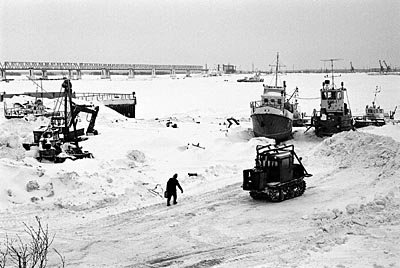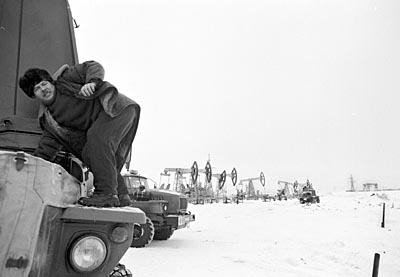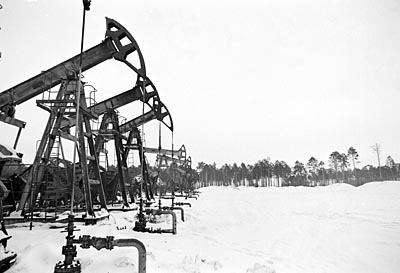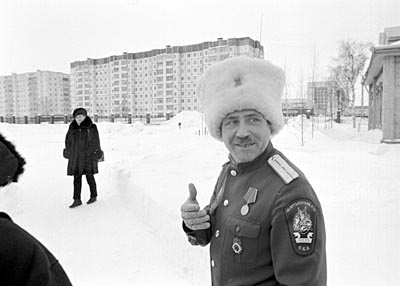 The
unfinished bridge between Soergoet and Neftejoegansk. In the foreground the little ferry.
Photo: Oleg Klimov/Fotoloods
The
unfinished bridge between Soergoet and Neftejoegansk. In the foreground the little ferry.
Photo: Oleg Klimov/Fotoloods The puritan and the pirate
A social economic experiment in Siberia
By FRANK WESTERMAN
tr. by Bert hamminga
for original click
Piraat, NRC Handelsblad
Moskou Bureau
SOERGOET, MARCH 3, 1999
In Siberia there are two identical towns, each at one side of
the river Ob. Both were built in Soviet times for oil industry purposes, and now they seem
to be part of a social-economic experiment. In one of them pure capitalism is introduced,
in the other nothing changed. Free market against collective care. The two bosses make the
difference: a pirate and a harsh Calvinist. At first the pirate seemed to be
unbreakable.
 The
unfinished bridge between Soergoet and Neftejoegansk. In the foreground the little ferry.
Photo: Oleg Klimov/Fotoloods
The
unfinished bridge between Soergoet and Neftejoegansk. In the foreground the little ferry.
Photo: Oleg Klimov/Fotoloods
Two towns in an experimental set up
The towns do not just look like an experimental set up,
they are. Here, in the remote taiga behind the Ural mountains, experiments are done
with people. The experiment: what happens if you release wild capitalism on a concrete
single purpose boom town build by the Soviet plan economy?
 Material
of the oil company Yukos in Neftejoegansk. Photo: Oleg Klimov/Fotoloods
Material
of the oil company Yukos in Neftejoegansk. Photo: Oleg Klimov/Fotoloods
The circumstances of this experiment with social engineering are almost scientific: you have a control group of a quarter of a million at the right bank of the Ob (Soergoet). And an equal sized group of test rats on the left bank (Neftejoegansk). The starting situation was virtually identical, both fully planned towns being built thirty years ago exclusively for the oil industry. Square street patterns and seven and nine story buildings make it hard indeed to know from sight in which of the two towns you are.
There is very little mutual influence. The car bridge under construction will not be finished, the bus service (by ferry in summer, by ice in winter) is cancelled, both towns have a runway and a daily Toepolev to Moscow. The demographics are identical: a pioneer generation of romantic Komsomols, attracted by the slogan "Oil for the Fatherland", and their children, raised in wealth: reduced tariff swimming pools, sauna's, ice hockey and athletics courts, cinema's, theatres and Black Sea holidays.
Soergoet and Neftejoegansk are multi ethnic germs of Soviet utopia, enjoying the highest density of fur coats in Russia. But: in Soergoet, there is demand for baby buggies and wedding dresses, not in Neftejoegansk. "I have cheap and expensive ones, and the strange thing is that my customers usually choose for the expensive ones", says a sales woman in Soergoet. Her colleague in Neftejoegansk also sells baby buggies and wedding dresses, but on bail. "We opened this shop because so many people move away, but the problem is: almost nobody wants to buy anything".
In the journal advertisements, apartments in Neftejoegansk cost three times as much as in Soergoet. These extreme differences arose the last two years. What is the cause? Properly viewed there is only one variable: the characters of the two bosses of the oil companies on which the respective towns depend. They rule like czars their respective monogorod (mono town, a Soviet term for a town running on nothing but oil)
After the Soviet Union fell apart in 1991, the oil industry was divided in 13 semi state companies. One of the dividing lines was the river Ob; the East fields were for Soergoet and the company Soergoetneftegas (Russia's number three if measured in gallons), the West fields for Yukos (number two), with Neftejoegansk as its headquarters
In 1995 and 1996 both were privatised. The harsh Siberian Vladimir Bogdanov, head of Soergoetneftegas, shielded his imperium from outsiders and had the pension fund buy the oil company. Competing bidders got literally locked up in the arrival hall of the airport until after the auction. Their complaints were in vain, and under Western investors Bogdanov got the nickname "red oil baron". Nothing changed in Soergoet.
New Oil King
When Yukos was put up for auction end of 1996, 33-year old Michail Chodorkovski, a Moscow chemist blown up on the social ladder, was smart enough to acquire the assignment to do this auction for his bank Menatep. At that time, Chodorkovski already was one of the captains of industry allowed to chose some pearls of Russian state property in exchange for financing the Jeltsin campaign. This boldish young man, wearing glasses -with the appearance of a beta student- started a computer collective and got permission to deal in foreign currency in the perestroika year 1988. The exchange offices of Chodorkovski and his friends soon acquired bank status, Bank Menatep. It grew fast into a mighty conglomerate.
 In the ninety's Menatep bought more than a hundred companies, no matter whether
they dealt in food, paper, textiles, chemicals or metal. Menatep also acquired editors and
engineering companies and took an enormous building with mirror front at the Moscow garden
ring. Chodorkosky succeeded in acquiring 80% of the Yukos stocks (estimated 2.000.000.000
US dollars) for 168.000.000 US dollars. Auction organiser Menatep claimed victory in the
Menatep auction in what has been called the "robbery of the century".
In the ninety's Menatep bought more than a hundred companies, no matter whether
they dealt in food, paper, textiles, chemicals or metal. Menatep also acquired editors and
engineering companies and took an enormous building with mirror front at the Moscow garden
ring. Chodorkosky succeeded in acquiring 80% of the Yukos stocks (estimated 2.000.000.000
US dollars) for 168.000.000 US dollars. Auction organiser Menatep claimed victory in the
Menatep auction in what has been called the "robbery of the century".
The echo of this gunshot could be heard in faraway Siberia. The local exploration and exploitation company with 60.000 workers was subsumed in the hierarchical Yukos structure, which meant that tax was not anymore paid in Neftejoegansk, but in Moscow. In line with Western advise (from the shock therapy goeroes) the responsibility for swimming pools, sauna's, ice stadiums -and all those things that made Siberian life bearable, was left to the town administration. Part of the experiment: no budget to the administration for these purposes.
The pro Western Chodorkovsky, dressed in Marlboro Classic shirts, was seen as a good example of the new Russian class of entrepreneurs, though US Amoco retired angrily from a common project. That was no inhibition for Business Week to proclaim Chodorkovsky as the new "oil king" of Russia. Early last year Chodorkovsky joined and alliance between him and Sibneft, owned by Kremlin godfather Boris Berezovski and Elf Aquitaine (France). Together they intended to bid on the crown jewel of the Soviet oil industry, Rosneft, with Shell (allied with Gazprom and Lukoil) as a competing bidder.
Chodorkovsky's philosophy: "If you want to play with the big guys, you have to be a big guy yourself". The auction of Rosneft failed, but Yukos managed to acquire the Siberic oil company Eastern Oil with a Western bank credit of 500.000 US dollar.
Only since the start of the ruble crisis August last year, Western analysts concede that Chodorkovsky overplayed his hand. Too long he saw the Siberian oil fields as the playing board of the game RISK! and this aggressive strategy now turns against him: Bank Menatep and Yukos is more and more often in default. The oil concern only by itself has a debt of 1.250.000.000 US dollar, to be repaid in the coming 2 years. Meanwhile the price of North Sea oil sank below 10 US dollars a barrel [has meanwhile gone up again tr.].
Of course, the blow was not felt in Moscow, but in Neftejoegansk. Phase two of the project was the firing of 44.500 of the 60.000 oil workers there. Investment and exploitation are postponed, and all that happened in the last sic months. The result: "Chodorkovsky would not be sure of his life if he would appear in Neftejoegansk". Vasili Petrovitch of the local newspaper "The Worker" claims. The Mayor who went into hunger strike against the "anti popular policy" of Yukos has been shot dead before his office and the funeral ended in a protest of 70.000 men, women and children carrying slogans like "Chodorkovsky to justice", and "Yukos murderer"
Mud baths for the oil workers
The control group in Soeergoet, at the other bank of the Ob looks shivering at the effects of the free market on their sister town. At their own side, nothing changed. No forced lay offs, the oil company pays tax in cash and in time, and finances as before in Soviet times the maintenance of swimming pools and the rest of the social fabric that characterised the Soviet economy. Soergoet is a USSR fossil and the people take Vladimir Bogdanov on their shoulders as if he on his own stopped the flood of capitalism at the river Ob.
Bogdanov belongs to the dullest of men. He neither smokes nor drinks. "If we say hello to him he barks back", Raisa Chodstjenko, his press agent, says. She copies him to scare us: "WAFF!!". Bogdanov hates photo sessions ("he is dissatisfied with his appearance") and journalists writing that he wears dark glasses and grey Soviet suits ("that is why he bought English specially made suits"). He is a workaholic unable to delegate. Does not go to Marbella or Miami for holidays, but to Bulgaria or Tsjechia, calling back all the time to ask how things are going.
For his 45th birthday Raisa made a little film, for which she visited his parents in a Siberian village. Simple people with some cows and some ground, growing tomato plants at the windows. In the garage she found an unused black Wolga. "We ride when we have a wedding in the village", father Bogdanov told.
"I hate Moscow with all those traffic jams", says the oil magnate, (meanwhile belonging to the top ten of Russian business men). "I love Soergoet". His philosophy "Russia has good reason to hold high the trousers of capitalism; they are full of holes and are a dreadful sight". Bugdanov is a conservative, he is against debts, never borrowed a ruble from anyone ("that only creates obligations"), immediately pays his taxes ("you have to pay them anyway"). Soergoetneftgas invested 1.000.000.000 US dollar in the improvement of oil fields in the crisis year 1998.
Almost everyone in the concrete town Soergoet talk positive, almost with humility about him. "Bogdanov conserved all blessings of the Soviet system", says Vladimir Stenkin. He runs the busy sport complex, disposing over three Finnish sauna's, a beauty salon called Elite, solarium,an aerobics hall, two swimming pools and a hall filled with fitness machines. "We get equipped with more and more new things, everything falls like manna from the sky". Stenkin is paid by the oil concern, just like everyone else here. "We could of course have started with commerce, but that would have led to brothels and casino's and we do not want that here".
The managers of the Cultural Centre and of the Ice Hall praise Bogdanov in one voice. There will be an ice hockey competition for the Soergoetneftgas Cup. The organiser invited the Ural club Tractor (Tsjelabinsk), Metallurg (Magnitogorsk) and Aerodrome (Houston, USA!). Even the president of the local trade union, Albina Tsikina, defends Bogdanov as patron saint of the town. Everything she says sounds almost unbelievable: "Bogdanov invests, he drills, he extends. And he does not deprive us of the privileges we had in Soviet times. We still have cold bonuses and every other year a free air ticket for the entire family to the Black Sea." At the border of the town Joegoslavs build a health resort with mud baths for the oil workers and their families.
Trade union leader Tsikina would want to recommend Bogdanov for the Russian presidency, "but we do not like to loose him". She is bitter about what happens at the other side of the river. "There everything happens at will. Neftejoegansk fell in the hands of Chodorkovsky, who is not interested in the fate of the population". Fired drill masters, welders and other specialists cross the ice river to find work at Bogdanov. "Seventy or so got a contract but the limit has been reached" Tsikina says. On behalf of her trade union she sends telegrams to the sister town Neftejoegansk to show solidarity against the "Moscow bandits"
Painted Copies of logo's
Stop five cars in Neftejoegansk, and four drivers will tell you they were fired in November and try to earn some as taxi driver. "Yesterday I was in Soergoet", says Sergej Basjkier from under his moustache, "I sought work, but they have new rules: candidates from Soergoet first, hopeless." At the border of Neftejoegansk in a long row of private garages private initiative is flowering: pump owners sell the dirtiest types of fuel, octane content not more than 80. Despite that their garage doors show, to gain trust, painted copies of Shell, Mobil and BP logo's.
 Soergoet. Foto: Oleg Klimov/Fotoloods
Soergoet. Foto: Oleg Klimov/Fotoloods
Yukos headquarters in Moscow tries to cope with the growing criticism
with PR. For relations with the Western press the American PR-company Burson
Marsteller is hired. a small army spindoctors has been hired to prevent a
"social explosion" in Neftejoegansk.
"The bottom line is that we are a private company dealing in oil" press man Alexander
Loktjev explains. Not Yukos, but the state fails to maintain an acceptable
level of services in a monogorod like Neftejoegansk. "We do not say: that is not our
business. If we really would have listened to our Western advisers and left the town to
its own we would have had a social explosion long ago"
Yukos made a plan to alleviate the pain: the superfluous oil workers are allowed to exploit ten almost dried out wells in so called "social joint ventures". Yukos does not have money for maintenance of these wells anyway. It is still nothing but an idea, and these social joint ventures can only be profitable under tax exemption by the town administration. "we wait for a new Mayor, but as soon as he is there we hope to make the agreement" says Loktjev.
Yukos remains convinced that Bogdanovs philosophy will, in the long run, prove inferior to Chodorkovsky's: "Bogdanov is afraid to borrow money. Soergoetneftegas stays provincial or national at most; but we become international", Loktjev says.
But the years of wild capitalism seem over in Russia: economic policy is no longer determined by market reformers given the benefit of the doubt by IMF, but by communists like Joeri Masljoekov (the former head of the USSR central planning department GOSPLAN) and Viktor Gerasjtsjenko (according to Harvard-economist Jeffrey Sachs "the worst central bank director of all times". Under growling president Primakof for the first time the oligarchs are outlawed: the first one to be dealt with last month was Boris Berezovski. Will Michail Chodorkovski be next?
For Chodorkovski the most worrying sign is the activity of the public prosecutor. There were forays in Berezovski's Sibneft and an order for research into "illegal procedures of privatisation". The way in which Bank Menatep acquired Yukos end of 1996 could fall into that category. Anyway Chodorkovski runs short of friends in Kremlin, government and Doema.
Bogdanov has now nationwide been "discovered" as saviour of Russia. And of course, we had only to wait for that, he became the new favourite of Western investors. The Wall Street Journal cal Bogdanov "the secret of Siberia", while the decimated group of stock exchange analysts (all the Moscow stock exchange needs to become dead is dying) has only one buy advise: Soergoetneftegas - ,,Russia's finest oil play''.
The financial Times writes in this context about "the paradox of recent Russian history", but that is much to weak. If you invest in stocks Soergoetneftegas, you invest -mutatus mutandis- in conservation of the last remains of the USSR.
Go to Questions